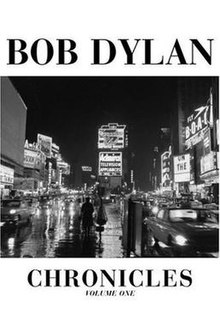Chronicles: Volume One

Hardcover jacket
|
|
| Author | Bob Dylan |
|---|---|
| Country | United States |
| Language | English |
| Subject | Bob Dylan |
| Genre | Autobiography Music |
| Publisher | Simon & Schuster |
|
Publication date
|
October 5, 2004 |
| Media type | Print (hardback & paperback) |
| Pages | 304 pp (first edition, hardcover) |
| ISBN | (first edition, hardcover) |
| OCLC | 56634799 |
| 782.42164/092 B 22 | |
| LC Class | ML420.D98 A3 2004 |
Chronicles, Volume One is the first part of Bob Dylan's planned 3-volume memoir. Published on October 5, 2004, by Simon & Schuster, the 304-page volume covers selected points from Dylan's long career. The book spent 19 weeks on the New York Times best-seller list for hardcover nonfiction books.Chronicles, Volume One was one of five finalists for the National Book Critics Circle Award in the Biography/Autobiography category for the 2004 publishing year.
Defying expectations, Dylan wrote three chapters about the year between his arrival in New York City in 1961 and recording his first album, focusing on a brief period of relative obscurity, while virtually ignoring the mid-1960s when his fame was at its height.
He also devoted chapters to two lesser-known albums, New Morning (1970) and Oh Mercy (1989), which contained insights into his collaborations with poet Archibald MacLeish and producer Daniel Lanois. In the New Morning chapter, Dylan expresses distaste for the "spokesman of a generation" label bestowed upon him, and evinces disgust with his more fanatical followers.
At the end of the book, Dylan describes with great passion the moment when he listened to the Brecht/Weill song "Pirate Jenny", and the moment when he first heard Robert Johnson’s recordings. In these passages, Dylan suggested that the process ignited his own songwriting.
Chronicles received many positive reviews, with The Telegraph remarking that the book had "garnered unanimous critical acclaim in the press."The New York Times said that the book "is lucid without being linear, swirling through time without losing its strong storytelling thread."
In an interview conducted by Jonathan Lethem, published in Rolling Stone, Dylan said he was very moved by the book's reception. "Most people who write about music, they have no idea what it feels like to play it. But with the book I wrote, I thought, ‘The people who are writing reviews of this book, man, they know what the hell they’re talking about.’ It spoils you … they know more about it than me. The reviews of this book, some of ’em almost made me cry—in a good way. I’d never felt that from a music critic ever."
...
Wikipedia
